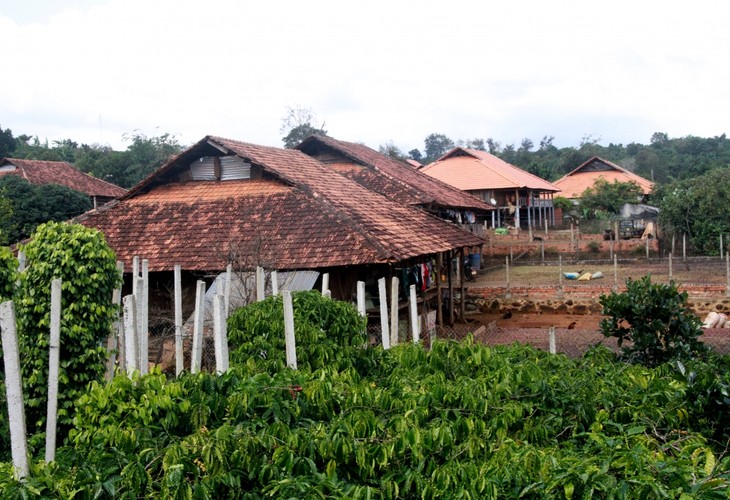(VOVWORLD) -Quang Hoa village’s Tam Dien hamlet in Krong Nang district is 100% Nung An ethnic minority. Since 1986, when the Nung people migrated from Cao Bang province to Dak Lak, their lives have greatly improved, but they still follow their traditional culture.
 Stilt houses in Quang Hoa village, Krong Nang district, Dak Lak province (Photo: VOV) Stilt houses in Quang Hoa village, Krong Nang district, Dak Lak province (Photo: VOV) |
Tam Dien hamlet, 4 km from the center of Ea Tam commune, has 100 households who live in a valley between broad rubber and coffee fields.
Nong Van Minh’s stilt house in the middle of a green coffee field stands out because of the bright red color of its new tile roof. Minh says all the architectural and decorative features of his house are in accordance with the traditional customs of the Nung people.
In 1987, Minh’s family moved from Cao Bang to Dak Lak, where the climate and soil are better for crops. Through Minh’s hard work, his family’s economic condition is getting better and better.
Minh told VOV that it’s easier to do business in Dak Lak than in his home town thus his family and the other villagers have become much better off.
“But I’ve maintained the customs and habits of the Nung An people for my children to follow. Wearing hats and other traditional clothing, for example. Living in a stilt house is cooler. It's a traditional custom I can't give up. I hope future generations will preserve it,” said Minh.
According to Hoang Dinh Tan, Secretary of Tam Dien hamlet’s Party cell, 58 of the 60 households in Quang Hoa village live in stilt houses which they built themselves following the traditional architecture of the Nung An ethnic group.
A traditional stilt house has five compartments and a wooden staircase on the left side of the house.
Tan said that following Nung beliefs, the stairs are an odd number for good luck. The stove in the main room is used to cook and warm the house, but it, too, brings good fortune.
“The people still follow traditions for weddings and funerals. Cultural exchanges have been held to keep these traditions alive. Young people can all speak the mother tongue. All households except two have built stilt houses,” said Tan.
Ea Tam commune is home to 19 ethnic groups, but the Tay and Nung make up nearly 90%. Over the years, Ea Tam has pursued socio-economic development that preserves and promotes the cultures of the local ethnic groups.
Quang Hoa village still preserves the Nung stilt houses and indigo weaving and is restoring the folklore of luon and love singing. Their unique culture is helping the locals develop community tourism.
La Be Thuy Trang, Deputy Chairwoman of Ea Tam’s People’s Committee, says every household in the commune has several hectares of land to grow coffee and profitable fruits like durian, macadamia, and avocado.
Improved economic conditions have made it easier for locals to contribute to the new-style rural building while preserving the Nung culture.
According to Trang, “While preserving their cultural identity, Quang Hoa villagers have worked together for economic development and poverty reduction. Many households in Quang Hoa have good incomes and spacious houses. The number of poor households is very small.”
After more than 35 years, the stilt houses in Quang Hoa remain intact and are considered by the Nung people as a local treasure.